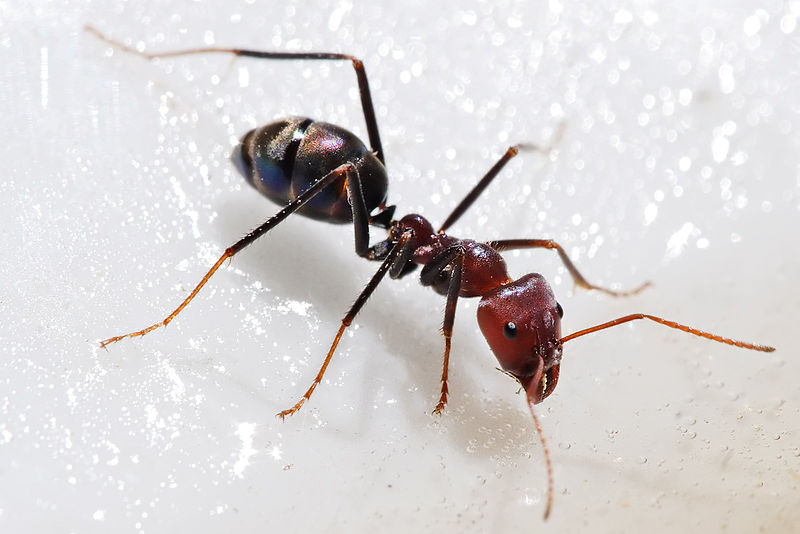A very good friend of mine from my stagehand days recently bought a house--a fixer upper in ant country--and asked for some help on that front.
Ants go where the food is, so first, make sure there's nothing for them to eat. This is most important! Cut off their supplies!
Now the battle can begin!
Put out the ant baits you can buy anywhere, but put them outside near their homes. I used to use those metal stakes that go in the ground. They work for a while, but eventually they learn to avoid them, so you have to keep changing brands. This is the artillery to soften them up a little.
Find where they're coming through the wall. Unless they're under the house, or living in the house somewhere, they're coming in through a crack, usually around a cable inlet hole or window. Caulk. You want to seal the holes anyway, for energy efficiency.
Now you're going to have to launch an attack on their fort. Follow their trail back to the home. If you don't care about growing anything in that spot for a while, pour a bunch of vinegar down the hole. Get the 10% vinegar if you can find it, but 5% is OK. If you dig the area up after wards and compost the soil with some grass clippings and food waste, it will balance out the pH and you can use the soil again.
If you do want to grow something there immediately, you can get some
Diatomaceous Earth
--not the kind for pools, but the finer kind used to kill bugs--you can pile it on the mound and in a radius of a foot or so, more if it's big. The powder is so fine it clogs the breathing pores in their skin. Be sure not to breathe the stuff, as it will do the same to your lungs. They will die trying to get out. In fact, they will build a bridge of dead ants and crawl over them, so you have to keep going there, raking the area free of dead any bridges, and reapply as needed. Watch for places where they try to tunnel out, and apply there to. Obviously, you're going to have to be patient and vigilant. Kind of like democracy.
If you really want to have some pyrotechnic fun, I suggest gasoline of kerosene. Not exactly organic, but you're going to let it soak in and then light it up. Careful. I suggest some sort of fuse so you can stand back when the fire geyser spews flaming ants into the sky.
If they're really bad, there is an
ant chalk that is technically illegal, but they sell it in Chinatown. It has a neurotoxin in it, so use gloves, and make sure the kid can't get near it. It's not technically organic, although a lot of people say it is. The active ingredients are Cypermethrin and Deltamethrin, which are both common, very weak insecticides which break down quickly (but are really bad for fish, so don't use near water). They are both Pyrethroids, synthetic chemicals that very closely resemble pyrethrins, which come from flowers. This is what a lot of ant sprays have in them, but I hate sprays as a lot of it gets in the air that way. Besides, they stink for days after you spray them.
Draw chalk lines where the ants are coming into the house, on concrete it works well, you have to press hard to make sure it gets into the stucco. They will not come back for a long time once they get a taste of that stuff.
Finally, learn to live with a few of them. Too many and there's obviously a food source available, so again, make sure every thing's sealed up. Battle them back as much as possible, but there will always be scouts. Kill them when you see them, but no need to freak. They're actually pretty clean, an amazing evolutionary engineering wonder. The colony acts like a single brain (I often call it the ant brain).
And they're just doing their (very important) job....




















